ADEPT | Gagauzia 2016 | Presidential 2016 | Elections 2015 | Bashkan 2015 | Gagauzia 2012 | Political Parties
Elections in Gagauzia as prelude of parliamentary elections
Elections without winner
The intrigue of elections to the People’s Assembly of Gagauzia held in two rounds on March 16 and 30, 2008 consisted in updating the configuration of political forces in the region. The same political groups which entered the race for Gagauz Governor (head of executive) in December 2006 committed themselves to contest the supremacy of the Party of Communists of the Republic of Moldova (PCRM) in the regional legislature. Namely, these were the adepts of the new Gagauz Governor Mihail Formuzal grouped under the nongovernmental organisation United Gagauzia Movement (UGM) and adepts of Comrat Mayor Nicolai Duduglo, who lost the electoral competition against Mihail Formuzal in December 2006.
The main stake of PCRM was to get a result allowing it to keep the status quo — the control over the People’s Assembly (PA). UGM adherents wanted the victory for the sake of harmonising the activity of PA and Governor, while adepts of Mayor Nicolai Dudoglo banked on a good enough score to be able to impose a compromise solution to the dispute between the two rival camps, by electing Dudoglo as PA chairman.
None of the three forces could win the elections that means to build or consolidate a majority in the Gagauz People's Assembly in order to elect its leadership. Although the reckoning of Comrat mayor's supporters was reasonable, none of the two rival forces wanted to accept the compromise solution proposed by Nicolai Dudoglo.
Specifics of Gagauz elections
Elections for the Gagauz PA have stronger features compared with the national parliamentary elections. This is a direct consequence of the majority electoral system in a politically undeveloped area. Confidence of citizens towards political parties is lower in Gagauzia than on country in general, where parties enjoy the confidence of only 15–20 percent of respondents. Political leaders from the region explain this attitude of citizens by the fact that the registration of regional parties is prohibited in Moldova. Under such circumstances, Gagauz voters choose to vote most credible persons from localities, with their political membership counting less. Of course, politically unaffiliated candidates — the independents — enjoy the highest confidence, as they promise to resolve the daily life problems faced by citizens.
Overall, 160 candidates have competed for the People’s Assembly and five of them have withdrawn themselves from the electoral race. Approximately half of candidates represented ten national political parties and the other half were independent competitors. In general, the political membership of candidates to PA, except for PCRM members, is irrelevant in Gagauzia.
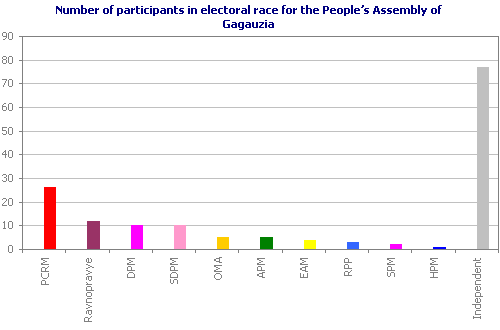
Independents develop their political preferences after elections only, grouping themselves into factions. The only solidly organised political force in Gagauzia, the PCRM, has also decided to enjoy this specific feature at the recent elections. PCRM concealed the political membership of approximately one third of its candidates who were registered as independents. Opponents of PCRM did not hesitate to speculate this situation, invoking the decline of the party and the fact that its symbol in ballot papers raises the repulsion of electors. The reply of PCRM was that resorting to subterfuges and more flexible approaches in order to maximise the result is not a defect but a political virtue. In this respect, it is true that the PCRM has built the Bloc for a Flourishing Gagauzia into a Renewed Moldova (BFGRM) before the electoral campaign, making public the list of candidates registered in 34 constituencies. Twenty-six of them competed under the PCRM aegis and another 8 candidates were independent. BFGRM did not have representatives in one constituency only. The electoral platform of BFGRM “A strong country — a strong Gagauzia” included the following key promises: gasification of the region; construction of water pipes; renovation of roads; computerisation of education; improving living standards by implementing social programmes; attraction of internal and foreign investments in the region, etc.
The second political force self-organised on the basis of platform of the nongovernmental organisation United Gagauzia Movement (UGM), attracting independent candidates in particular. However, UGM has also attracted representatives of other political forces opposing the PCRM. Once the electoral campaign began, UGM has published its list of 19 candidates: 12 independents, six representatives of the Ravnopravye Movement and one competitor on behalf of the Our Moldova Alliance (AMN). The accession of Ravnopravye and AMN candidates to UGM was not coordinated at level of leaders of parties. None of candidates representing the Republican People’s Party (RPP) has joined the UGM, though Governor Mihail Formuzal is a RPP leader (or perhaps he has already left the party?). The electoral programme of UGM generally focussed on support for the electoral platform of Governor Formuzal — “Eleven steps forward people”).
The competition between main contestants had also a very specific nature, focussing on clarification of some problems such what sources — from local or national budget — should finance the electoral campaign for the People’s Assembly; which of the two — Chisinau or Comrat — contributed more to persuading Russia to provide humanitarian aid; which was the destination of Russian aid — the Republic of Moldova in general or Gagauzia alone; which is the most devoted partner of Russia — Chisinau central authorities or Comrat regional authorities? Of course, these clarifications should influence support of electors, suggesting them who have more rights to distribute humanitarian aid and thus enjoy their votes.
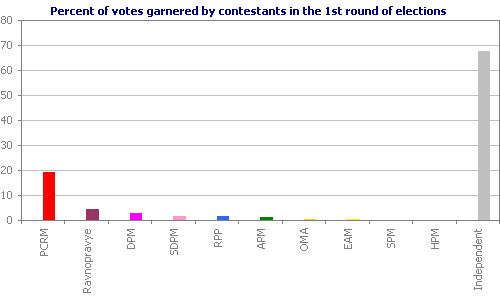
Before elections, main electoral contestants chose to display their ambitions and confidence that they will win. As regards the correctness of the electoral process, intermediary conclusions from reports by observers representing the Council of Europe have been released, as they said that the electoral process was fair in spite of small deviations inherent to some societies in transition. Contestants submitted few appeals to electoral bodies or law courts. Just after the totals, when allied political forces realised that they did not harvest the expected results, competitors started accusing each other.
Main reported shortcomings include among others the use of “administrative resources”; the influencing of decisions by Central Electoral Commission of Gagauzia (CECG); illegitimate registration of candidates who submitted wrong information about their domicile; “bribing” of electors by certain unidentified “benefactors” who suddenly covered bad roads in localities with stones, but voters should realise the political membership of these persons; illegal electoral campaigning including on Election Day etc. The Comrat Court of Appeal has finally validated the mandates of all winners with one exception.
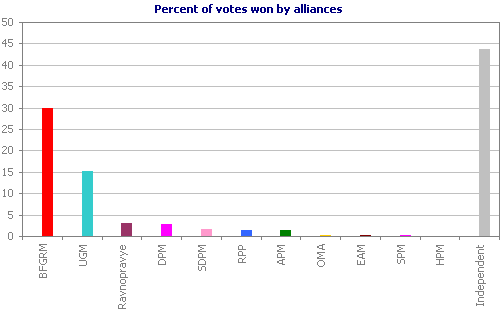
Blocked activity of new People’s Assembly
The blocked activity of the People’s Assembly was the immediate consequence of elections in Gagauzia. Under the law on special legal status and Regulation of Gagauzia, the new People’s Assembly shall be created not later than a month after elections. Leading bodies of the regional legislature — chairperson, deputy chairpersons and presidium of the People’s Assembly shall be elected by majority of elected lawmakers at the first sitting.
The evident division of the PA members and the fact that PA chairperson and deputy chairpersons are secretly elected have overturned side-scenes deals regarding commitments to build a majority capable to elect leading bodies and ensure the functioning of PA. The relative victory of PCRM was finally more important than the number of mandates won by representatives of this party, but less significant than promised by PCRM candidates.
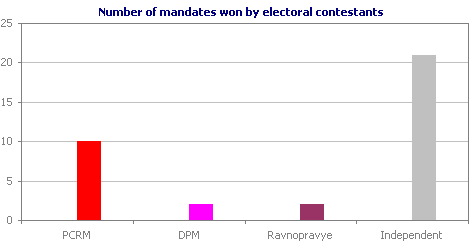
PCRM has thanked electors for their support before the first PA sitting on April 30, 2008. The gratitude appeal was signed by 17 PA members, which means that four independents joined the 13 BFGRM representatives.
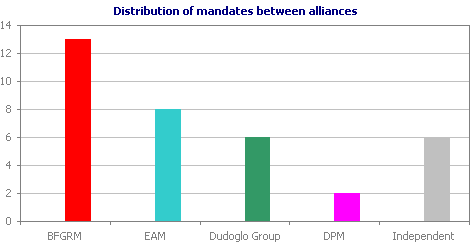
Meanwhile, the Court of Appeal has invalidated the mandate of independent lawmaker elected in the village of Tomai. UGM supporters said that the Court of Appeal has invalidated the mandate of the candidate concerned on the basis of political encroachments aimed to ensure the least the parity of votes for the election of PA and to eventually let BFGRM recover this mandate at new elections and ensure an absolute majority in PA alone.
Suspicions of UGM supporters were based on the fact that the result of the winner from Tomai against BFGRM candidate in the runoff vote was at the limit: 50.63 percent vs. 49.37 percent, with a difference of 26 votes only. BFGRM supporters replied that frauds committed against their candidate halted him from winning the runoff vote, after he garnered 47.7 percent vs. 30.1 percent of his rival in the first round. This juggling of results of the first and second rounds of elections is not convincing. However, there is evidence that the PCRM was more skilful in the political race vs. UGM. Thus, formal UGM leader Fiodor Gagauz has provided the greatest sensation. He defeated his rivals in the first round, garnering 49.1 percent of the votes, compared with 37.3 percent of main BFGRM candidates and lost the runoff vote with 49.5 percent versus 50.5 percent.
The result of coalitions has also determined candidates for the PA chairperson office. The group of Nicolai Dudoglo nominated its leader to compete for this office. PCRM raised Congaz Mayor Demian Caraseni. UGM proposed Serghei Cernev (candidate on behalf of Ravnopravye), chairman of the Vulcanesti district. The UGM candidate confirmed suppositions that elite groups from Ceadir-Lunga and Vulcanesti districts will ally to exceed the share of those from the district of Comrat. Mihail Formuzal enjoyed the great support of electors from Ceadir-Lunga and Vulcanesti at the December 2006 election of Governor and he defeated Nicolai Dudoglo who was massively voted by electors from the district of Comrat.
Given that situation, Nicolai Dudoglo called upon other political forces to elect him as head of the Gagauz legislature. Otherwise, the executive and legislative branches in Gagauzia would be in a tightened condition, should the PCRM take over the control on PA. On the other hand, the confrontation line will target at Comrat-Chisinau, should the UGM take over the control on PA, as antagonisms between PCRM and UGM stressed as back away as Mihail Formuzal was Ceadir-Lunga mayor have deepened after the 2006 and recent elections. In principle, the compromise proposed by Duduoglo could attenuate both tensions between branches of regional administration and between central and regional governments. But none of the two rival forces — PCRM and UGM — has hurried up to give green light.
The result of the voting of candidates to the PA chairmanship has produced a true sensation. Only 14 out of 17 members of the enlarged BFGRM coalition have secretly elected PCRM candidate Demian Caraseni. UGM candidate Serghei Cernev won 12 votes and Nicolae Dudoglo gained 8. The same day, Caraseni won 15 votes in the second round and Cernev gained 13 votes, while 6 ballot papers were invalidated. These results allows one to evaluate the true composition of the three PA factions. UGM attracted four out of five unaffiliated independent candidates, though three of them are part of the 17-strong group which signed the PCRM appeal to electors. The group of Mayor Dudoglo is made of 6 lawmakers who invalidated their ballot papers in the second round, so that to halt the two forces from winning and to keep its leader in the race this way. One may suppose that the two lawmakers representing the Democratic Party of Moldova have joined the Dudoglo group in the first round of election of PA chairperson and they made another choice in the second round. The last supposition would be reasonable in the light of rumours about partnership relations between Mayor Dudoglo and DPM.
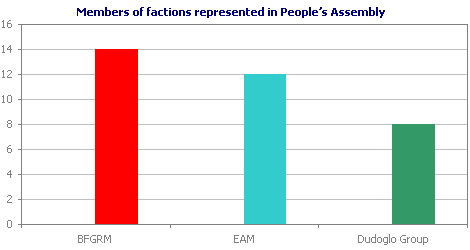
The new People’s Assembly held one more sitting on May 12, 2008 but it failed to relieve the activity of the representative forum. Therefore, the uncertainty has grown both because of impossibility to build a functional majority and of the lack of clear prescriptions on ways to get rid of the impasse.
So far, lawmakers representing UGM and the Dudoglo group have made a decision allowing Governor Mihail Formuzal to convoke the PA for a new sitting to elect ruling bodies. This decision was contested by PCRM deputies who were indignant over three matters:
- There are no terms for the Governor to convoke the PA and this leaves room for suspicions that the Governor could convoke a new sitting after an eventual deal between UGM and Dudoglo group;
- Recently elected lawmakers do not have access to PA offices and public mass media;
- The governor has no right to get involved in PA activity after the PA was convoked for the first sitting accordingly to legislation. According to PCRM lawmakers, though PA did not elect its leading bodies at the first constitutive meeting, it may convoke sittings under own regulation, which says that one third of PA members may convoke them. Also, PCRM lawmakers claim that the eldest PA member should chair the representative forum as long as leading bodies are elected.
As the eldest PA member represents the PCRM, it is understandable why the Dudoglo group let the Governor convoke the People’s Assembly until election of PA leading bodies. In this respect, Governor Formuzal invited PA members on May 21, 2008 to build a wide coalition. The idea is welcome, but it is unclear how main political forces understand this appeal and how PA leading offices would be distributed should a wide coalition be established. So far, Nicolai Dudoglo is the holder of the so-called “golden share” but his manoeuvres are not lasting. Under legislation, the PA membership is incompatible with any other remunerated activity. A national regulation obliges functionaries running incompatible offices to make a choice within two months after the incompatibility was assessed. The way this norm will be applied is unclear, but both the PCRM candidate to the PA chairmanship, Demian Caraseni, and Nicolai Dudoglo could have to choose very soon either to continue chairing the localities their represent or to be PA members.
UGM supporters proposed the dissolution of the new People’s Assembly and organisation of new elections. It is unclear how reasonable this idea is since the PCRM proved that it is organised much better, enjoys access to much larger resources than other competitors do, and the local budget lacks funds to hold elections. Even more, legal regulations on relief of PA activity are very vague and it is hard to estimate ways to get rid of this situation. The Regulation of Gagauzia stipulates only two clear situations when the Governor may dissolve the PA:
- Impossibility of PA to grant a trust vote to the Executive Committee of Gagauzia within 45 days after the Governor proposes its members;
- Impossibility to adopt the budget of the autonomy within two months after the draft was raised for examination.
Conclusions
The Gagauz electorate is politically unstructured in general. Political forces group up in the regional legislature accordingly to opportunity criteria based on “the capacity of convincing” behind the scenes, on conflicting polarisation of relations between local leaders or the centre-region dimension. Therefore, ad-hoc political blocs in Gagauzia are fragile and vulnerable in front of eventual backstairs deals.
The new law on parties and amendments to the Election Code ignore all appeals by Gagauz leaders to create conditions for building regional parties and to find a formula for election of Gagauz representatives to the Parliament of Moldova. That means that the confidence of the Gagauz electorate towards national parties will be very low in continuation.
Although PCRM has stopped its decline and even restored its rating in the Gagauz autonomy at a certain extent, it cannot dominate the situation any longer and it is unprepared for compromises. In this regard, developments after the recent elections in Gagauzia suggest that more serious blockages could occur at national level after the spring 2009 parliamentary elections, that means that political forces should start working out pre-election and post-election strategies in order to find solutions to impasses born by eventual excessive division of the new Parliament.
|
2016 2015 2014 2012 2011 2010 2009 2008 [22] 2007 2006 2005 2004 2003 2002 2001
|
Elections [107] Foreign policy / European integration Political parties Transnistria Governmental policies Government — opposition relations Civil society / NGO Justice and legal bodies
|


